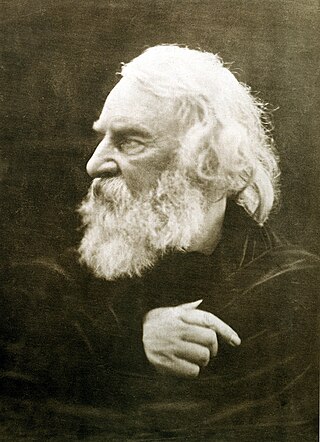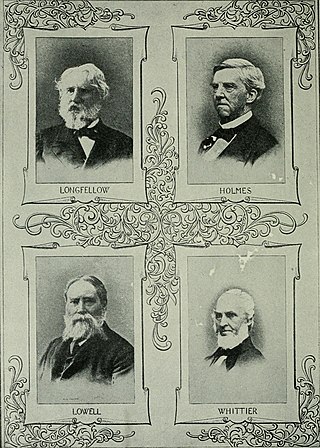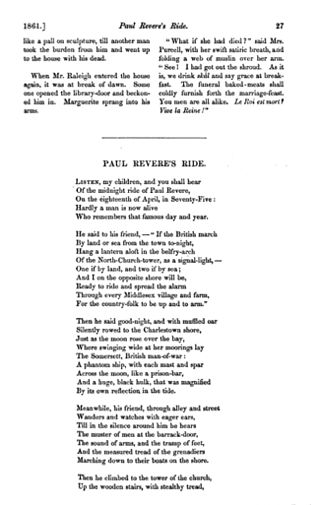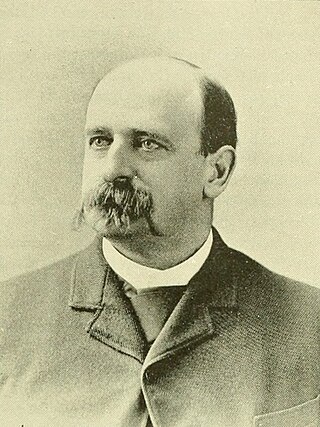
Henry Wadsworth Longfellow was an American poet and educator. His original works include the poems "Paul Revere's Ride", "The Song of Hiawatha", and "Evangeline". He was the first American to completely translate Dante Alighieri's Divine Comedy and was one of the fireside poets from New England.

Sudbury is a town in Middlesex County, Massachusetts, United States. At the 2020 census, it had a population of 18,934. The town, located in Greater Boston's MetroWest region, has a colonial history.

"The Wreck of the Hesperus" is a narrative poem by American poet Henry Wadsworth Longfellow, first published in Ballads and Other Poems in 1842. It is a story that presents the tragic consequences of a skipper's pride. On an ill-fated voyage in winter, he brings his daughter aboard ship for company. The skipper ignores the advice of one of his experienced men, who fears that a hurricane is approaching. When the storm arrives, the skipper ties his daughter to the mast to prevent her from being swept overboard. She calls out to her dying father as she hears the surf beating on the shore, then prays to Christ to calm the seas. The ship crashes onto the reef of Norman's Woe and sinks; the next morning a horrified fisherman finds the daughter's body, still tied to the mast and drifting in the surf. The poem ends with a prayer that all be spared such a fate "on the reef of Norman's Woe."

The Longfellow House–Washington's Headquarters National Historic Site is a historic site located at 105 Brattle Street in Cambridge, Massachusetts. It was the home of noted American poet Henry Wadsworth Longfellow for almost 50 years, and it had previously served as the headquarters of General George Washington (1775–76).

"Excelsior" is a short poem written in 1841 by American poet Henry Wadsworth Longfellow.

The fireside poets – also known as the schoolroom or household poets – were a group of 19th-century American poets associated with New England. These poets were very popular among readers and critics both in the United States and overseas. Their domestic themes and messages of morality presented in conventional poetic forms deeply shaped their era until their decline in popularity at the beginning of the 20th century.
"I Heard the Bells on Christmas Day" is a Christmas carol based on the 1863 poem "Christmas Bells" by American poet Henry Wadsworth Longfellow. The song tells of the narrator hearing Christmas bells during the American Civil War, but despairing that "hate is strong and mocks the song of peace on earth, good will to men". After much anguish and despondency the carol concludes with the bells ringing out with resolution that "God is not dead, nor doth He sleep" and that there will ultimately be "peace on earth, good will to men".
Nationality words link to articles with information on the nation's poetry or literature.
"The Saga of King Olaf" is a poetic sequence by American poet Henry Wadsworth Longfellow, published in 1863 as part of his book Tales of a Wayside Inn.

"The Children's Hour" is a poem by American poet Henry Wadsworth Longfellow, first published in the September 1860 edition of The Atlantic Monthly.

Windmill Cottage is a historic house and former windmill at 144 Division Street in East Greenwich, Rhode Island. It was the home of George Washington Greene, a former American consul to Rome and historian. It was purchased for Greene by his friend, the poet Henry Wadsworth Longfellow.

"The Village Blacksmith" is a poem by Henry Wadsworth Longfellow, first published in 1840. The poem describes a local blacksmith and his daily life. The blacksmith serves as a role model who balances his job with the role he plays with his family and community. Years after its publication, a tree mentioned in the poem was cut down and part of it was made into an armchair which was then presented to Longfellow by local schoolchildren.

"A Psalm of Life" is a poem written by American writer Henry Wadsworth Longfellow, often subtitled "What the Heart of the Young Man Said to the Psalmist". Longfellow wrote the poem not long after the death of his first wife and while thinking about how to make the best of life. It was first published anonymously in 1838 before being included in a collection of Longfellow's poems the next year. Its inspirational message has made it one of Longfellow's most famous poems.

"Paul Revere's Ride" is an 1860 poem by American poet Henry Wadsworth Longfellow that commemorates the actions of American patriot Paul Revere on April 18, 1775, although with significant inaccuracies. It was first published in the January 1861 issue of The Atlantic Monthly. It was later retitled "The Landlord's Tale" in Longfellow's 1863 collection Tales of a Wayside Inn.

The Saturday Club, established in 1855, was an informal monthly gathering in Boston, Massachusetts, of writers, scientists, philosophers, historians, and other notable thinkers of the mid-19th century.

Kavanagh is a novel by the American poet Henry Wadsworth Longfellow.

Richard Henry Dana III was an American lawyer and civil service reformer.

Alice Mary Longfellow was a philanthropist, preservationist, and the eldest surviving daughter of the American poet Henry Wadsworth Longfellow. She is best known as "grave Alice" from her father's poem "The Children's Hour".

Homer Rogers was an American businessman and politician who served on the Boston Board of Aldermen and was the Republican nominee in the 1892 Boston mayoral election.

The Wayside Inn is a historic inn in Sudbury, Massachusetts, United States. The inn is included on the National Register of Historic Places as part of the listed Wayside Inn Historic District. It became an inn, called Howe's Tavern, in 1716, making it the oldest continuously operating inn in the United States. The Beekman Arms Inn and others make various claims towards being "continuously operating", resulting from The Wayside Inn's closure period of 1861–1897, after the death of Lyman Howe.



















